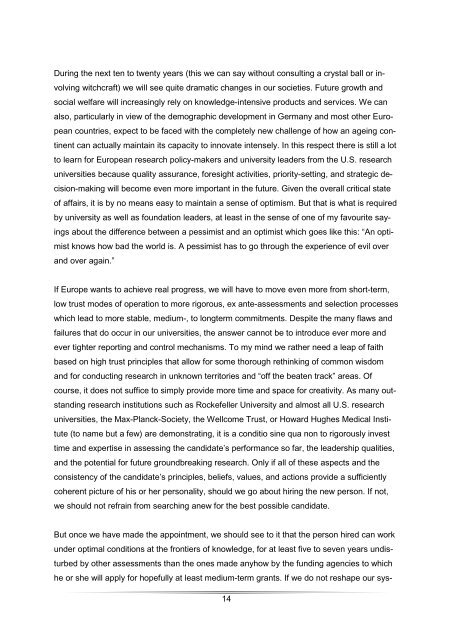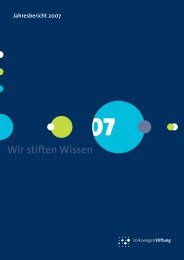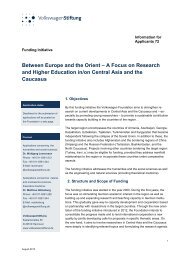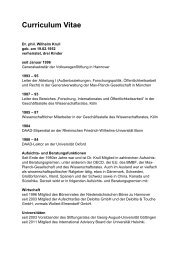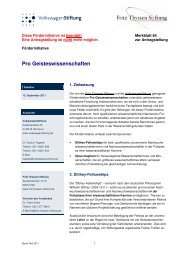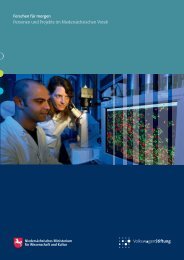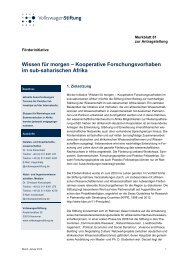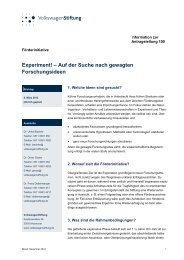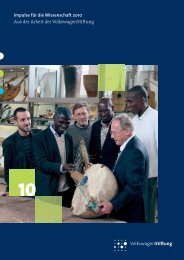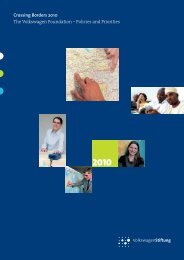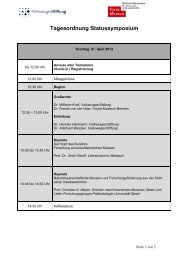1 Wilhelm Krull Europe's New Strive for Excellence in Research and ...
1 Wilhelm Krull Europe's New Strive for Excellence in Research and ...
1 Wilhelm Krull Europe's New Strive for Excellence in Research and ...
Create successful ePaper yourself
Turn your PDF publications into a flip-book with our unique Google optimized e-Paper software.
Dur<strong>in</strong>g the next ten to twenty years (this we can say without consult<strong>in</strong>g a crystal ball or <strong>in</strong>volv<strong>in</strong>g<br />
witchcraft) we will see quite dramatic changes <strong>in</strong> our societies. Future growth <strong>and</strong><br />
social welfare will <strong>in</strong>creas<strong>in</strong>gly rely on knowledge-<strong>in</strong>tensive products <strong>and</strong> services. We can<br />
also, particularly <strong>in</strong> view of the demographic development <strong>in</strong> Germany <strong>and</strong> most other European<br />
countries, expect to be faced with the completely new challenge of how an age<strong>in</strong>g cont<strong>in</strong>ent<br />
can actually ma<strong>in</strong>ta<strong>in</strong> its capacity to <strong>in</strong>novate <strong>in</strong>tensely. In this respect there is still a lot<br />
to learn <strong>for</strong> European research policy-makers <strong>and</strong> university leaders from the U.S. research<br />
universities because quality assurance, <strong>for</strong>esight activities, priority-sett<strong>in</strong>g, <strong>and</strong> strategic decision-mak<strong>in</strong>g<br />
will become even more important <strong>in</strong> the future. Given the overall critical state<br />
of affairs, it is by no means easy to ma<strong>in</strong>ta<strong>in</strong> a sense of optimism. But that is what is required<br />
by university as well as foundation leaders, at least <strong>in</strong> the sense of one of my favourite say<strong>in</strong>gs<br />
about the difference between a pessimist <strong>and</strong> an optimist which goes like this: “An optimist<br />
knows how bad the world is. A pessimist has to go through the experience of evil over<br />
<strong>and</strong> over aga<strong>in</strong>.”<br />
If Europe wants to achieve real progress, we will have to move even more from short-term,<br />
low trust modes of operation to more rigorous, ex ante-assessments <strong>and</strong> selection processes<br />
which lead to more stable, medium-, to longterm commitments. Despite the many flaws <strong>and</strong><br />
failures that do occur <strong>in</strong> our universities, the answer cannot be to <strong>in</strong>troduce ever more <strong>and</strong><br />
ever tighter report<strong>in</strong>g <strong>and</strong> control mechanisms. To my m<strong>in</strong>d we rather need a leap of faith<br />
based on high trust pr<strong>in</strong>ciples that allow <strong>for</strong> some thorough reth<strong>in</strong>k<strong>in</strong>g of common wisdom<br />
<strong>and</strong> <strong>for</strong> conduct<strong>in</strong>g research <strong>in</strong> unknown territories <strong>and</strong> “off the beaten track” areas. Of<br />
course, it does not suffice to simply provide more time <strong>and</strong> space <strong>for</strong> creativity. As many outst<strong>and</strong><strong>in</strong>g<br />
research <strong>in</strong>stitutions such as Rockefeller University <strong>and</strong> almost all U.S. research<br />
universities, the Max-Planck-Society, the Wellcome Trust, or Howard Hughes Medical Institute<br />
(to name but a few) are demonstrat<strong>in</strong>g, it is a conditio s<strong>in</strong>e qua non to rigorously <strong>in</strong>vest<br />
time <strong>and</strong> expertise <strong>in</strong> assess<strong>in</strong>g the c<strong>and</strong>idate’s per<strong>for</strong>mance so far, the leadership qualities,<br />
<strong>and</strong> the potential <strong>for</strong> future groundbreak<strong>in</strong>g research. Only if all of these aspects <strong>and</strong> the<br />
consistency of the c<strong>and</strong>idate’s pr<strong>in</strong>ciples, beliefs, values, <strong>and</strong> actions provide a sufficiently<br />
coherent picture of his or her personality, should we go about hir<strong>in</strong>g the new person. If not,<br />
we should not refra<strong>in</strong> from search<strong>in</strong>g anew <strong>for</strong> the best possible c<strong>and</strong>idate.<br />
But once we have made the appo<strong>in</strong>tment, we should see to it that the person hired can work<br />
under optimal conditions at the frontiers of knowledge, <strong>for</strong> at least five to seven years undisturbed<br />
by other assessments than the ones made anyhow by the fund<strong>in</strong>g agencies to which<br />
he or she will apply <strong>for</strong> hopefully at least medium-term grants. If we do not reshape our sys-<br />
14


